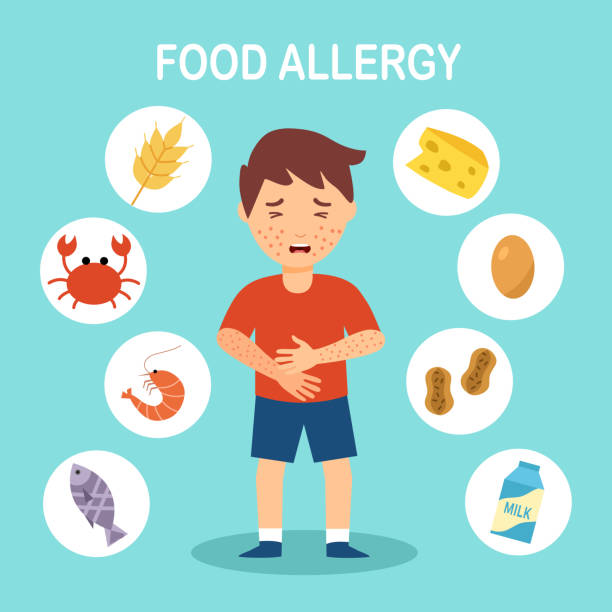Food allergies and intolerances are conditions that can cause adverse reactions in individuals who consume certain types of food. Food allergies are immune system reactions that occur when the body mistakenly identifies certain proteins in food as harmful, triggering a range of symptoms that can vary in severity from mild to life-threatening.
Food intolerance, on the other hand, occurs when the body has difficulty digesting certain types of food, leading to uncomfortable symptoms such as bloating, gas, and diarrhea.
Understanding these conditions is crucial as they can significantly impact an individual’s quality of life and require careful management to prevent severe allergic reactions or chronic health issues.
Food Allergy
Food allergy is a serious medical condition that affects millions of people worldwide. It is an immune system response to certain proteins in food that the body perceives as harmful. When a person with a food allergy consumes a triggering food, the immune system produces antibodies that release histamine and other chemicals into the bloodstream, causing a range of symptoms.
The causes of food allergy are complex and not fully understood, but researchers believe that genetic predisposition and environmental factors such as exposure to pollution and dietary changes may play a role. Common food allergens include peanuts, tree nuts, shellfish, fish, wheat, soy, and dairy products.
The signs and symptoms of a food allergy can vary widely and can include hives, swelling of the lips, tongue, and throat, nausea, vomiting, abdominal pain, and difficulty breathing. In severe cases, a person may experience anaphylaxis, a life-threatening allergic reaction that can cause shock, respiratory distress, and cardiovascular collapse.
Individuals with food allergies must avoid trigger foods. For them seeking medical advice and working with a healthcare professional to develop an emergency action plan is essential for managing this condition effectively.
Food Intolerance
Food intolerance is a condition where a person experiences adverse reactions to certain foods. Unlike food allergies, food intolerance does not involve the immune system but rather results from the body’s inability to digest or metabolize certain food components. Causes of food intolerance can include enzyme deficiencies, sensitivity to food additives, and conditions such as irritable bowel syndrome.
Common food intolerances include lactose intolerance, which is the inability to digest lactose, a sugar found in milk and dairy products, and gluten sensitivity, which involves an adverse reaction to gluten, a protein found in wheat, barley, and rye.
The signs and symptoms of food intolerance can be unpleasant and may include bloating, gas, abdominal pain, diarrhea, and nausea. These symptoms can develop gradually over several hours or even days after consuming the triggering food. Unlike food allergies, food intolerance symptoms are generally not life-threatening.
The management of food intolerance involves identifying and avoiding trigger foods, keeping a food diary, and working with a healthcare professional to develop a plan to manage symptoms.
In some cases, digestive enzymes or other medications may be prescribed to help manage symptoms. Overall, understanding food intolerance and its causes is essential for individuals to maintain a healthy and balanced diet while avoiding discomfort and potential health issues.
Diagnosis and Treatment
Diagnosing food allergies and intolerances involves a range of tests and procedures. For food allergies, skin prick tests and blood tests may be used to identify the presence of antibodies that react to specific allergens. Elimination diets may also be used to identify trigger foods, where the individual systematically eliminates suspected allergens from their diet and then reintroduces them to see if symptoms recur.
Individuals must seek medical advice before making any changes to their diet, as self-diagnosis can be dangerous and potentially life-threatening. Working with a healthcare professional can ensure accurate diagnosis and management of symptoms, reducing the risk of severe allergic reactions.
Treatment options for food allergies and intolerances include antihistamines, which can help manage mild symptoms, and epinephrine auto-injectors, which are used to treat severe anaphylaxis. Dietary modifications, such as eliminating trigger foods, can also be effective in managing symptoms.
Individuals with food allergies and intolerances need to avoid trigger foods and carry necessary medication at all times. This can help prevent life-threatening complications and ensure a prompt treatment in case of an emergency. Overall, seeking medical advice and following a management plan can help individuals live safely and comfortably with food allergies and intolerances.
Conclusion
Food allergies and intolerances are serious conditions causing a range of symptoms and life-threatening complications. Seeking medical advice is vital to managing symptoms, which impact an individual’s quality of life. Public awareness and research can prevent and manage food allergies, benefiting public health and easing the healthcare burden.
One way to prevent and manage food allergies and intolerances is through ensuring the food free from such specific substances by food testing. SMSLA is a leading food testing laboratory in India that provides comprehensive, prompt and reliable testing services for food allergens, additives, contaminants, and more.
Their advanced testing methods and state-of-the-art facilities ensure accurate and reliable results, helping individuals and businesses make informed decisions about food safety and quality. By promoting SMSLA as a top food testing lab in India, we can contribute to the prevention and management of food allergies and intolerances and improve public health outcomes.











